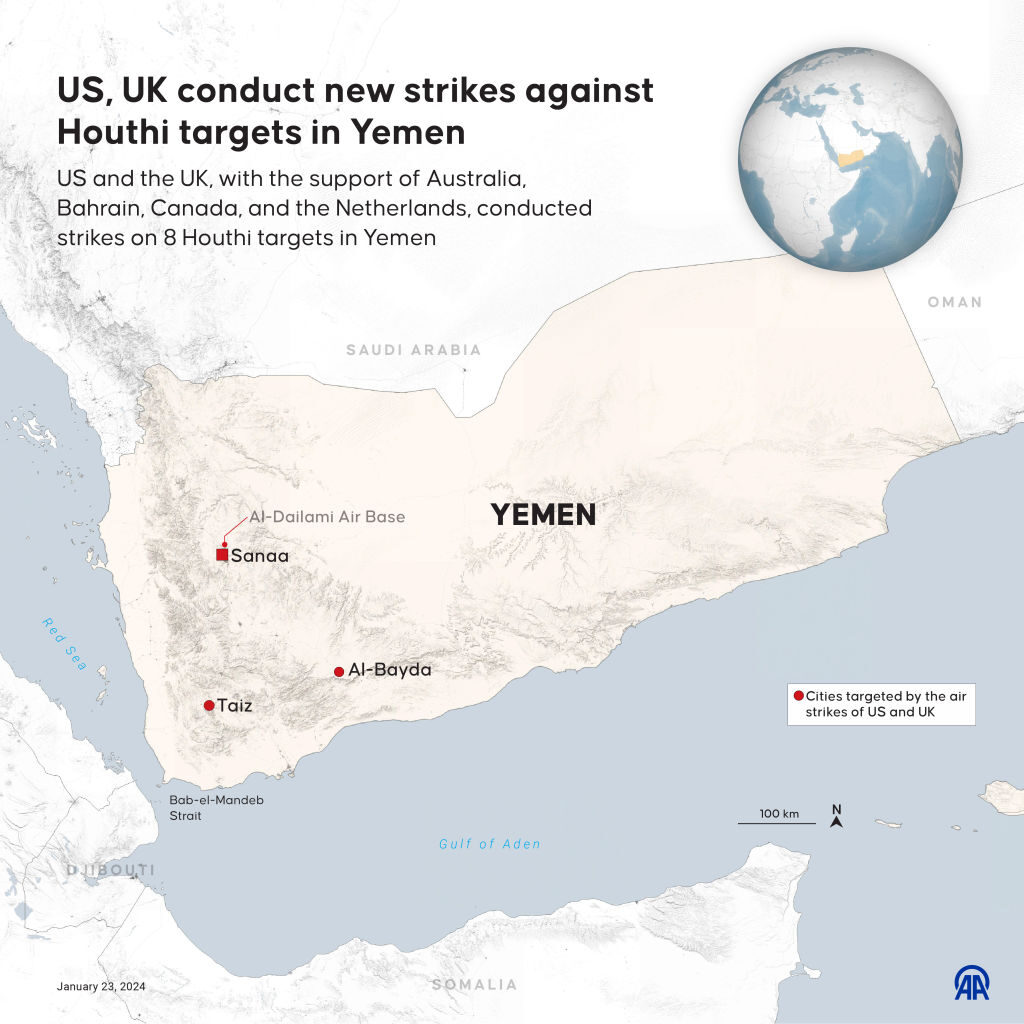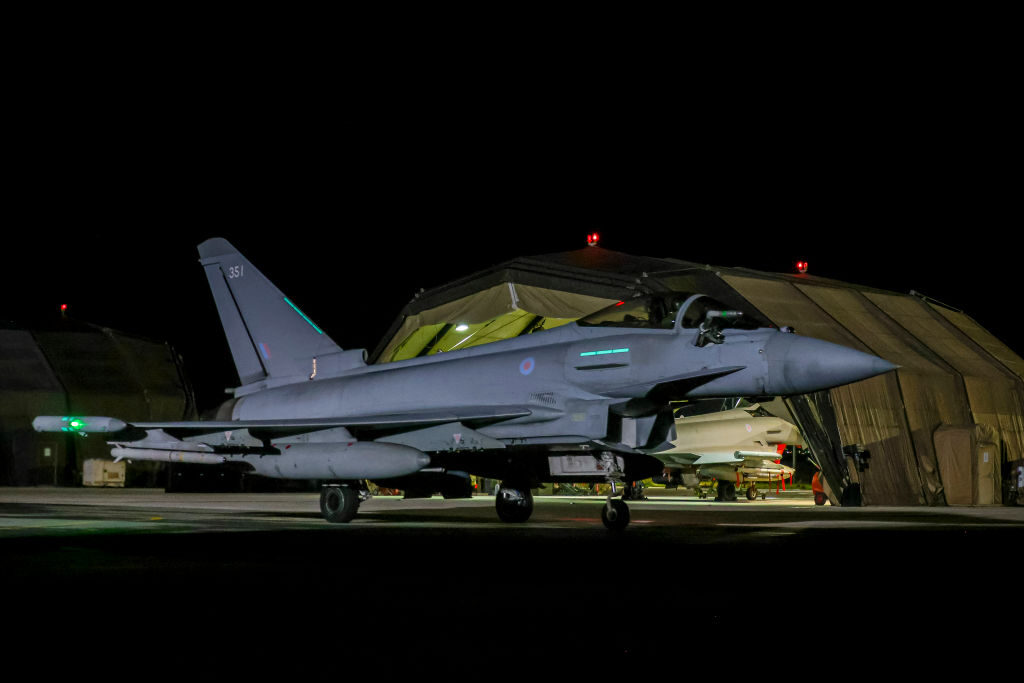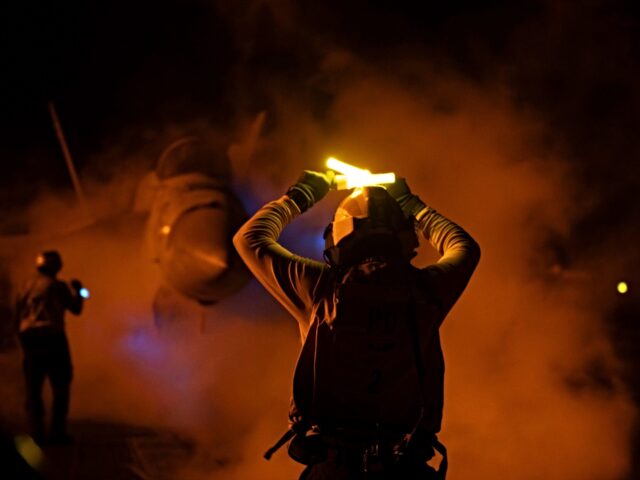The United States and the United Kingdom struck more Houthi targets in Yemen on Monday in an eighth round of strikes, just days after President Joe Biden admitted airstrikes were not working to deter the militia group from attacking ships in the Red Sea.
Asked if the airstrikes in Yemen are working, Biden said on January 18, “Well, when you say ‘working,’ are they stopping the Houthis? No. Are they going to continue? Yes.”
Defense officials on Monday, however, argued that while the Houthis still had capability, airstrikes against the Houthis have “removed significant Houthi capability.”
“We definitely feel that the strikes we have taken, the strikes tonight, the January 11th strikes with the same coalition partners and a number of self-defense strikes against imminent threats that have taken place in the interim have removed significant Houthi capability,” a senior military official said during a background briefing to reporters.

An infographic shows where U.S. and UK forces, with the support of Australia, Bahrain, Canada, and the Netherlands, conducted strikes on eight Houthi targets in Yemen. (Yasin Demirci/Anadolu via Getty Images)
“That does not mean they have no more capability but we definitely believe that has had an impact,” the official added.
Officials said the latest round of U.S.-U.K. strikes were launched from air, surface, and sub-surface platforms targeting eight locations with Houthi missiles, drones, and weapons storage areas.
The strikes were conducted with Tomahawk Land Attack Missiles (TLAMs) and manned aircraft from the U.S. Navy and the UK Armed Forces and an estimated 25-30 munitions were used, the military official said.
The military official said it was the first time an underground weapons storage was hit.
Officials were unable to say exactly how many targets they actually hit. They said the number of casualties was “unknown,” but stressed they sought to keep collateral damage low, and target systems, not people.
“Precision-guided munitions were used to destroy the targets and also to minimize collateral damage,” the military official said.

In this handout image provided by the UK Ministry of Defence, a RAF Typhoon returns to RAF Akrotiri after carrying out air strikes against Houthi military targets in Yemen on January 23, 2024 in Akrotiri, Cyprus. ( MoD Crown Copyright via Getty Images)

U.S. Central Command forces alongside UK Armed Forces, and with the support from Australia, Bahrain, Canada, and the Netherlands, conducts strikes on 8 Houthi targets in Iranian-backed Houthi areas of Yemen, on January 23, 2024. (CENTCOM / Handout/Anadolu via Getty Images)
Despite the continuing volley of strikes, the military official said their intention is to “deescalate, to restore calm in the Red Sea.”
The military official stressed that the strikes are not related to the coalition to protect commercial ships passing through the Red Sea, Bab-al-Mandab, and Gulf of Aden.
A senior defense official asserted the strikes were “grounded in Article 51 of the United Nations Charter” and “reflects our inherent right to self-defense.”
Officials said the latest round of strikes were conducted with support from Australia, Bahrain, Canada and the Netherlands. The nations, along with the U.S. and U.K. said in a statement:
The Houthis’ now more than thirty attacks on international and commercial vessels since mid-November constitute an international challenge. Recognizing the broad consensus of the international community, we again acted as part of a coalition of like-minded countries committed to upholding the rules-based order, protecting freedom of navigation and international commerce, and holding the Houthis accountable for their illegal and unjustifiable attacks on mariners and commercial shipping.
Our aim remains to de-escalate tensions and restore stability in the Red Sea, but let us reiterate our warning to Houthi leadership: we will not hesitate to defend lives and the free flow of commerce in one of the world’s most critical waterways in the face of continued threats.
The Houthis began striking U.S. and international merchant vessels in the Red Sea in November, in what they said was solidarity with Palestinians, after Palestinian terrorist organization Hamas conducted a terror attack against Israel.
The unprecedented terrorist invasion resulted in more than 1,200 casualties. Israel launched a ground offensive in immediate response.
RELATED: Biden Co-Chair — ‘No Surprise’ We Haven’t Deterred Houthis Yet
The U.S. surged military assets to the region in order to prevent the spread of the Israel-Hamas conflict to other nations, but since Hamas’s initial attack, Iran-backed proxy forces have stepped up their attacked U.S. troops in Iraq and Syria, in addition to the Houthi attacks on ships in the Red Sea and surrounding areas.
U.S. military action against the proxy forces and the Houthis have so far not prevented continuing attacks, and the Houthis have vowed to continue its strikes.
Follow Breitbart News’s Kristina Wong on ”X”, Truth Social, or on Facebook.

COMMENTS
Please let us know if you're having issues with commenting.